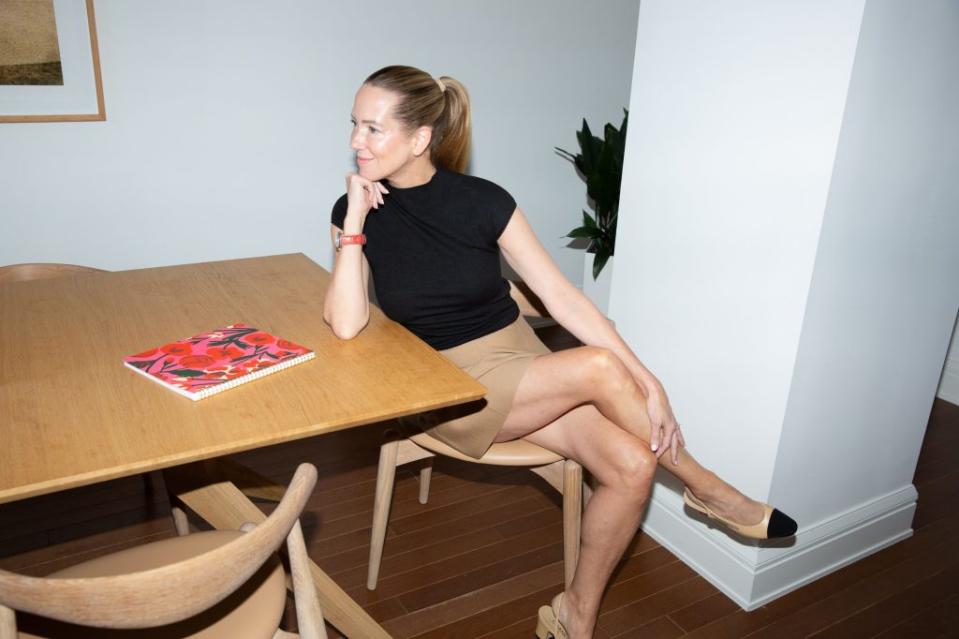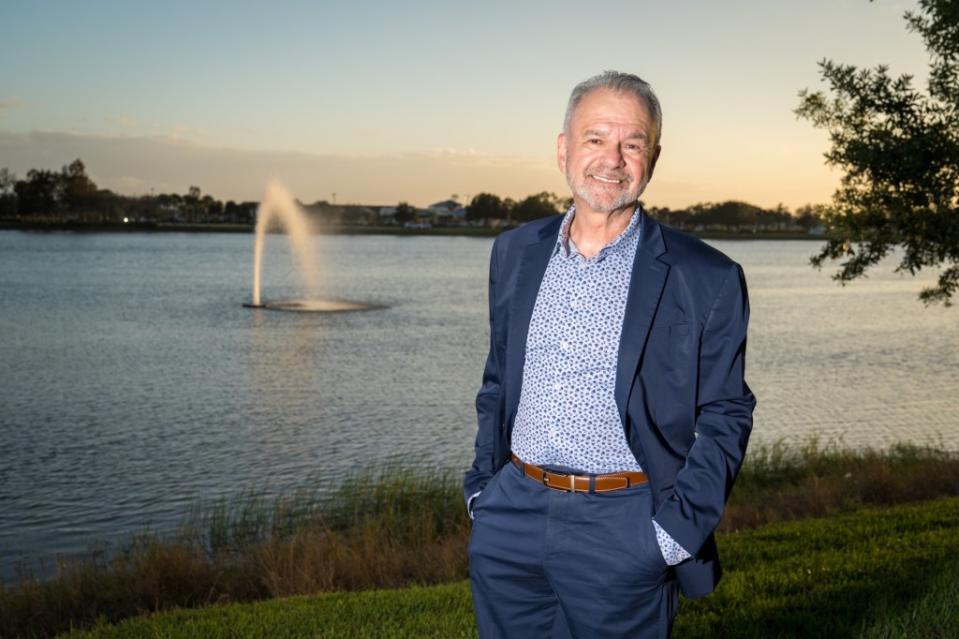How one woman built a business charging $25,000 for 4 months of dating app help, favored by wealthy millennials, their parents, and golden bachelors
Amy Nobile was catfished for the first time after she had already been running her dating coaching service, Love, Amy, for two years. Nobile helps clients from New York City to Hong Kong navigate the wild world of dating apps to “find their person,” using techniques like personal coaching and dating-profile optimization. In 2021, Nobile picked up the phone for a first call with a prospective client, Sarah, whom she had been speaking with over email.
But it wasn’t Sarah who picked up the phone. It was Sarah’s mother—Marsha.
“She went on a rant for 20 minutes about how her daughter is not getting any younger, and she had to take control,” the 54-year-old recounts. “She's going to gift this to her daughter and we need to get her daughter married and ready to be pregnant. I was a little bit gobsmacked.”
Nobile was used to working with millennials who put love on hold for their careers and older divorcees re-entering the dating scene. But this was the first time a parent reached out to hire the love guru, going so far as to impersonate Sarah during the initial contact. (Nobile ended up telling Sarah to call her down the road when she was ready). She deemed it a “crazy one-off catfishing experience,” but since then, Nobile receives a similar plea for help about once a month from parents hoping to marry off their 30-something daughter, she tells Fortune. “It's desperation,” she says.
While that speaks volumes to parents’ chagrin over the growing millennial trend in delaying marriage and kids, it also speaks to how much Nobile’s business has grown since she started it five years ago. When I first interviewed her at the end of 2019, she was charging nearly $5,000 for three months of dating app profile revamps, ghost bantering, and dating advice. That’s since evolved to helping clients work on identifying what’s blocking them from love—a four-month package costing $25,000, with the option to continue on a month-by-month basis (which Nobile estimates 25% of her clients do). Those footing the bill have expanded from wealthy millennials to their even wealthier parents, and from divorcees to 70-something seniors looking for a second shot of love in the wake of The Golden Bachelor.
Such growth appears impressive against the backdrop of the pandemic and America’s growing dating app fatigue. Juggling 12 clients, a 10-person waitlist, and a budding book deal, Nobile projects working with 36 new clients this year (three a month), anticipating six clients who will extend beyond four months. That puts her on track to rake in $1 million. She credits the success of her business to keeping it small, authentic, and on demand.
When dating is ‘like landing on Mars’
Starting Love, Amy was what Nobile considers the “biggest plot twist of my life.” The former PR maven amicably divorced her husband of 20 years in 2017—and quickly found herself navigating the horrors of the New York City dating scene. She tried chatting up strangers at Starbucks and waiting for friends to set her up, to no avail. “It was like landing on Mars,” she says.
Ignoring stories of friends’ online dating traumas, Nobile then moved to experiment with dating apps, an urge she credits to her “nerdy anthropological brain.” Soon, she was going on three to four dates a day, three to four times a week (an exhausting effort she wouldn’t recommend to her clients). Eventually, she met her now husband on Bumble. After teaching a few friends her tricks of the trade, Nobile says she realized she hit a dating market hole in which she could help people intentionally date in the modern world.
Thanks to word-of-mouth and an article in The New York Times, Nobile was soon juggling 15 to 20 clients, swiping and bantering for them on the apps, answering dating emergency texts (like what to wear on a date), and helping them figure out what they want in a partner. “I started primarily helping people get online and overcome their fear of using dating apps,” she says.

But once she’s taken over clients’ profiles, it allowed them to use her as a crutch, she adds—not conducive to their long-term relationship health. “Someone can swipe all day, but if they still have fear around finding their person or being lovable, then it’s wasted,” she says. Leaning into her spirituality (less religion, more manifestation), she started helping her clients do more inner work and redesigned her program to become more of a course, hiking her rates about five times along the way.
That coursework looks something like this: A 15-page intake form that helps Nobile assess clients’ level of self-love, four books to read including Signs by Laureline Jackson and The Four Agreements, and an eight-page document on everything from the art of bantering to core alignments. After each first date, clients fill out a worksheet with questions like How did your nervous system feel? Did you laugh?, with follow-up questions after subsequent dates. Nobile says she also requires them to journal.
The process is supposed to help people realize how they show up in their dating life, she explains. It’s about tearing down their emotional armor—figuring out how their “love energy is blocked”—and helping them become more authentic, magnetic, and confident. “It’s more focused on the energy, the perception of how you're really being received versus how you think,” Nobile says.
Consider one client, who was an animal lover. Nobile says she struggled to figure out her energy block until she learned the client’s mother had subtly suggested she get rid of a pet or two to make herself more appealing to a suitor, creating a subconscious feeling that there was no one who would accept her. As she tells it, once they got to the bottom of it, the client opened up and is now happily dating another animal lover. “We're either operating from fear or love; I can tell pretty quickly where on the continuum someone is,” she says.
Still, Nobile credits her widespread popularity across all age groups to her varied approach, as well as her PR and marketing brain. “I can appeal to a CEO, a housewife who's divorced, a millennial who's like all about crystals,” she says. “And then I can appeal to someone who is like, ‘Please don't use the word ‘manifesting’ ever.”
From egg freezers to golden bachelors
Nobile’s first clients were what she calls her “egg freezers”—what she describes as the typical 35-year-old Type-A woman who has frozen her eggs at least once and is emerging from her career, mystified at why the same principles that won her professional success aren’t landing her a date. Once she began sharing the company’s origin story, she started attracting more 40-plus clients. And, slowly, men came to comprise about 5% to 10% of her client base.
But Love, Amy came to a halt when the pandemic hit, making dating near impossible. Nobile thought the business would tank, but says she saw a surge in clients who didn’t want to be alone. The emergence of Zoom as a widely accepted communication medium also helped her expand her business across U.S. cities and even international waters (she has had five international clients), she says.
It's around this time that the desperate parents entered the scene. She says she’s had eight clients where the parents paid for their child, with six success stories (which she defines as a client entering a committed relationship using what they learned from the program).
And, she says, those in their 60s, 70s, and early 80s have flooded her inbox since The Golden Bachelor gave senior citizens an “electricity jolt” to find love again.

Gary Evans, a 71-year-old health care business owner in Port St. Lucie, Fla., reached out to Nobile last November after his wife passed away. His daughter, who had a business relationship with Nobile, recommended her.
Evans, who is on a “mission” to find the woman to spend the rest of his life with, tells Fortune that Nobile has helped him figure out which dating app he should be on (Hinge and Bumble) and what he’s looking for in a partner. Having her has helped him navigate dating for the first time in 50 years, he says; her “knowledge just cut through the clutter” and has made dating fun.
“I learned something from every person I meet,” he says. “So there's really no downside to it other than my time, and what better way to spend my time than with a pretty girl doing fun stuff.”
Love coach, life coach, and energy worker
Roughly a dozen years after they became mainstream, dating apps have become tiresome for many people. In an Axios/Generation Lab survey of college and grad students, 79% of them said they don’t use dating apps at all. More millennials are trying to meet people IRL, and a number of modern-day speed-dating companies are emerging to cater to that crowd. People who are swiping are growing increasingly frustrated with the way algorithms work. Match Group’s stock price has fallen from $169 per share in October 2021 to $36 per share this month.
But the apps aren’t going away anytime soon. While individual apps aren’t seeing the growth they once did, given how saturated the dating app market has become, Morgan Stanley projects the industry will deliver at least 10% annual growth by 2030. And about 42% of adults say in a 2023 Pew survey that online dating has made searching for a long-time partner easier.
Nobile isn’t deterred by the dating app burnout—that’s exactly where she feels her services come in. “There is a huge misperception that the people on the dating apps are different than the people in real life,” she says. “I hear this all the time: ‘I wouldn’t date 99% of people on these apps. I’m like, well ‘Would you date 99% of the people walking down the street? No, you wouldn't.’ It's all perception.”
She’s also not deterred by the competition, which includes over 2,000 matchmakers and in-demand dating coaches. She believes the way she marries advice on modern technology and the apps with holistic energy work sets her apart from the crowd. As one client recently told her, she says, if a love coach, life coach, and energy worker had a baby, it would be Nobile.
She’s also available around the clock, which she says isn’t typical for many coaches who offer set hours of availability. “If you're getting ghosted on a Tuesday, you're not waiting till Friday to talk to me,” she says. “You're gonna text me like, ‘WTF, I'm freaking out.’”
Nobile has always felt she’s the only one who can do this, which means that Love, Amy will remain small, despite the several investors she says have offered to scale it. Currently, she’s shopping around a book about unblocking yourself to be open to love. She says it’s multi-layered and spiritually focused, but a book that anybody, including a CEO, can pick up.
She estimates her overall success rate at 70%—down from the 85% she cited in 2019, but likely more proportional to the number of clients she’s had since then. Clients don’t necessarily have to find someone within the four months she works with them; she says it typically happens within a year. After the initial four months, “it should be like a baby bird flying out of the nest—you should have every tool you need to fly and do well,” she says.
This story was originally featured on Fortune.com

 Yahoo Finance
Yahoo Finance 